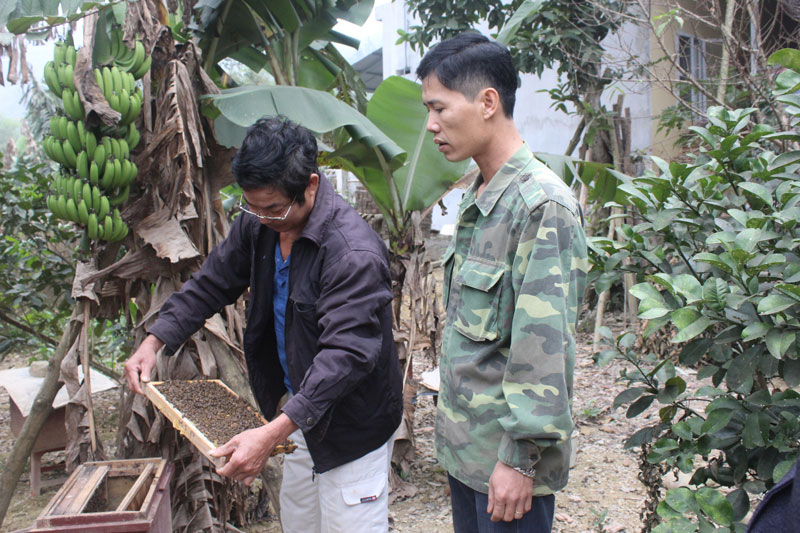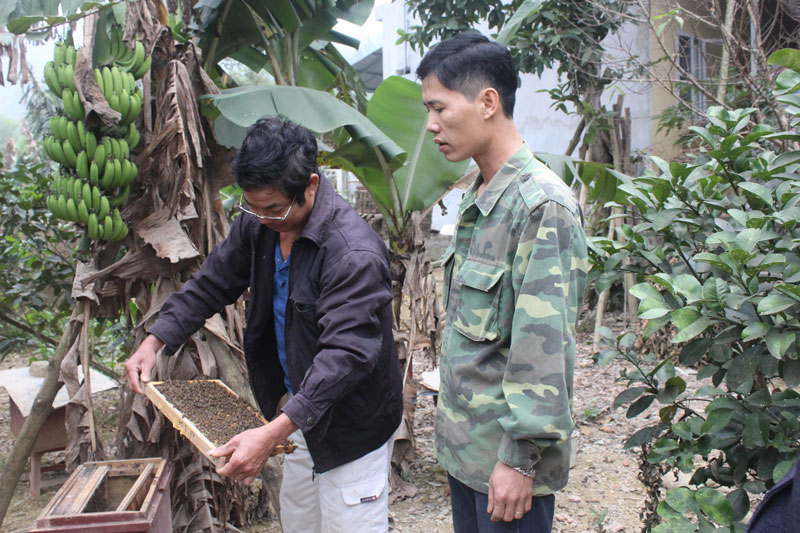
(HBO) - We visited the beekeeping model of Le Van Hao’s family in Tan Lap hamlet - one of the longest and biggest beekeeping households in Dan Hoa commune, Ky Son district. Previously, his family only kept 1-2 herds for the daily use. Up to now, after more than 20 years of experience, he has nearly 100 herds, earning over 200 million VND each year.
Le Van Hao’s family in
Tan Lap hamlet, Dan Hoa commune (Ky Son distrit) rakes in hundreds of millions
of VND from beekeeping each year.
Beekeeping is not
difficult, but it requires beekeepers’ carefulness, deep knowledge of bees’
characteristics, flowers and seasons for collecting honey. Bees should be given
antibiotics to prevent rotten larvae, which caused by environmental pollution. They
should also be transferred to areas where there are many flowers for sucking nectar. This work is usually done at night as bees return
to sleep, aiming to avoid dispersal and impact of sudden climate change.
Every day, Hao and his
wife are busy with checking barrels containing bee’s nests, which are placed on
the hill behind his house. Flowers of logan and litchi trees, eucalyptus and
acacia are the best for collecting honey. The best time for producing honey is
from February to July. Especially in May, Hao’s family can collect thousands of
litres of honey, which is sold at 150,000 VND – 200,000 VND per litre.
The development of the
model has helped his family improve incomes, becoming a role model in the
commune’s beekeeping movement.
Currently, Dan Hoa
commune is home to about 100 beekeeping households with a total of nearly 3,000
herds, which produce 16,000-18,000 liters of honey worth over 2.5 billion VND
per year. Realising the economic effectiveness of beekeeping, many other households
have actively learned and implemented this model.
Dinh Xuan Thao,
Chairman of the communal People’s Committee said beekeeping is not a new business
in Dan Hoa. Formerly, it was developed in a small scale. In recent years, local
households took use of hill areas to promote the model, increasing the number
of beekeeping households from 30 in 2016 to 100 in 2017.
The commune authorities have asked relevant agencies to take suitable measures
to support beekeeping development, towards turning it into a spearhead sector in
the local economy./.
According to data from the Hoa Binh Provincial Party Committee, the industrial production index for the first six months of 2025 is estimated to have increased by 20% compared to the same period last year. This marks the highest year-on-year growth rate for this period since 2020.
In the first six months of 2025, Hoa Binh province’s export turnover was estimated at 1.145 billion USD, marking an 18.11% increase compared to the same period in 2024. Import turnover was estimated at $ 804 million, a 17.15% increase, which helped the province maintain a positive trade balance.
The lives of the ethnic minority farmers in Tan Lac district have gradually improved thanks to the new directions in agricultural production. This is a testament to the collective strength fostered through the professional associations and groups implemented by various levels of the district’s Farmers’ Union.
With the motto the "product quality comes first,” after nearly one year of establishment and operation, Muong village’s Clean Food Agricultural and Commercial Cooperative, located in Cau Hamlet, Hung Son Commune (Kim Boi district), has launched reputable, high-quality agricultural products to the market that are well-received by consumers. The products such as Muong village’s pork sausage, salt-cured chicken, and salt-cured pork hocks have gradually carved out a place in the market and they are on the path to obtaining the OCOP certification.
In the past, the phrase "bumper harvest, rock-bottom prices" was a familiar refrain for Vietnamese farmers engaged in fragmented, small-scale agriculture. But today, a new spirit is emerging across rural areas of Hoa Binh province - one of collaboration, organisation, and collective economic models that provide a stable foundation for production.
Maintaining growing area codes and packing facility codes in accordance with regulations is a mandatory requirement for agricultural products to be eligible for export. Recently, the Department of Agriculture and Environment of Hoa Binh province has intensified technical supervision of designated farming areas and packing facilities to safeguard the "green passport" that enables its products to access international markets.



